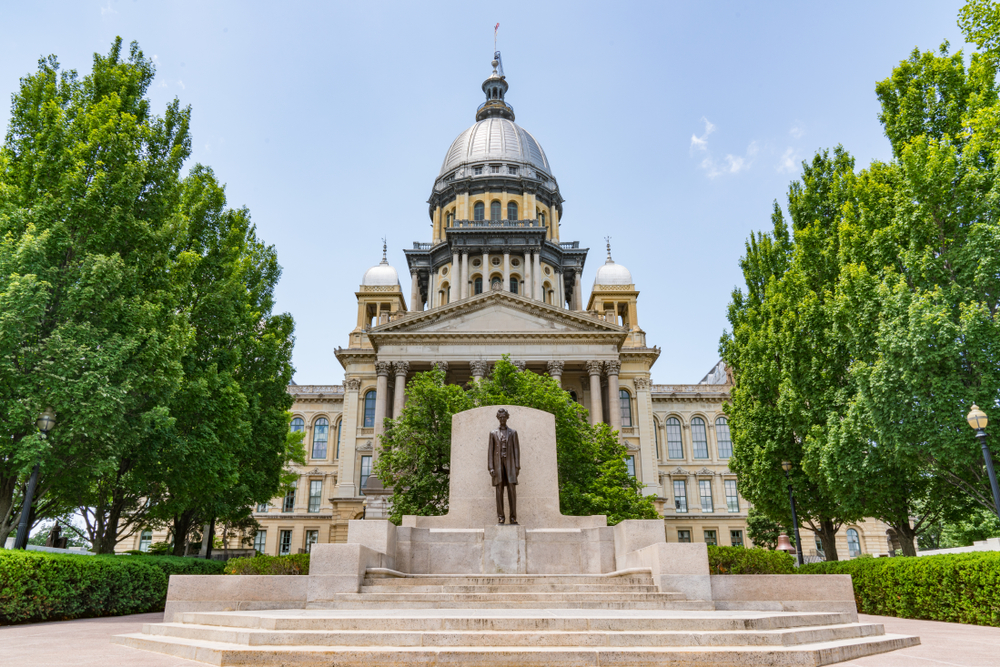Springfield Illinois Hospice Care: How to pay for Hospice Care, Licensing and Regulations, and Questions to ask
Springfield is the state capital of Illinois, but it feels just like a small town. Traffic is not bad, it’s easy to get around, and it’s walkable. You can get from one side of Springfield to the opposite side in 30 mins. Many subdivisions are quiet and the neighborhoods have great ratings with amazing school districts. Springfield is best known for being the home of our 16th President Abraham Lincoln and the place where President Barack Obama spent his early career in politics.

- Springfield Illinois Hospice Care: How to pay for Hospice Care, Licensing and Regulations, and Questions to ask
- About Hospice in Springfield
- Considerations when looking for care in Springfield
- Cities Near Springfield
- Local Hospitals and Healthcare Providers
- Signs it may be time to look into hospice care
- What is Palliative care and respite care and how are they different from hospice?
- How to pay for Hospice Care?
- Who Pays for Palliative Care?
- Questions about Hospice Care
- Resources and Links – Illinois
- Search other areas for Hospice Care
Signs it may be time to look into hospice care
- Your loved one has made multiple trips to the emergency room.
- The condition continues to progress, affecting quality of life.
- The individual has been admitted to the hospital several times in the last year with the same or worsening symptoms.
- Does loved one wish to remain at home, rather than spend more time in the hospital.
- Your loved one has decided to stop receiving treatment.

What is Palliative care and respite care and how are they different from hospice?
Let’s discuss what makes them different:
Palliative Care
Palliative care refers to any care that alleviates symptoms, whether there is hope of a cure by other means or not. Both palliative care and hospice care are intended to provide comfort for the individual and family. This care focuses on easing pain and discomfort to help people have the highest possible quality of life. It is appropriate at any stage of life, not just end of life.
Respite care
Taking care of a loved one who is terminally ill can be exhausting and emotionally draining for family members, and especially if family members are the caregivers. Respite care provides relief for those looking after the terminally ill individual. They may be checked into temporary hospice and provide a much needed break for family caregivers.
Hospice
Hospice care is an option for people who have a life expectancy of six months or less. In place of ongoing curative measures, hospice involves palliative care (pain and symptom relief), enabling the individual to live their final days with purpose, grace, dignity, and support from family and staff. The purpose is for the individual to spend their final days in a comfortable, familiar environment, with their loved ones enabling them to focus their attention with help of staff. Some hospitals, nursing homes, and other health care facilities offer hospice care on-site – however, it is most often provided in the person’s home.
About Hospice in Springfield
When it is time for hospice care, being in a safe and comfortable environment is the goal, surrounded by loved ones and familiar faces. Illinois hospice care is a concept of care, not a specific place of care. It is for those who have been living with a terminal illness or only recently received a serious diagnosis of six months or less life expectancy. This specific type of care is there to ease the burden of 24-hour care. It provides a respectful, comfortable care setting for your loved one’s final months and weeks or days. It is an option to consider and can be especially helpful for families, or those seniors without family to provide end-of-life care.
The Illinois Department of Public Health licenses and regulates hospice care agencies in the state and has rulemaking authority for hospice in the state. Regulations address requirements for hospices contracting with state Medicaid programs and the rules pertaining to patients.
Considerations when looking for care in Springfield
In Springfield, the summers are long, warm, and humid; the winters are short, freezing, snowy, and windy; and it is partly cloudy year round. Over the course of the year, the temperature typically varies from 21°F to 86°F and is rarely below 3°F or above 93°F.
As the largest city in central Illinois, with a population of 117,000, there are endless opportunities when seeking care and finding comfort in aging.
Hospice Communities near Springfield, Illinois
Elara Caring V
Springfield, Illinois 62703
Kindred Hospice
Springfield, Illinois 62704
Hospice Care Of Illinois
Springfield, Illinois 62781
Cities Near Springfield
- Rochester – 12 miles east of Springfield
- Sherman – 12 miles north of Springfield
- Curran – 10 miles west of Springfield
- Chatham – 10 miles north of Springfield
How to pay for Hospice Care?
Medicare, private health insurance, and Medicaid (in 43 states) covers hospice care for patients who meet eligibility criteria.
Private insurance and veterans’ benefits may also cover hospice care under certain conditions. In addition, some hospice programs offer healthcare services on a sliding fee scale basis for patients with limited income and resources. To get help with your Medicare questions call 1-800-MEDICARE (1-800-633-4227) or visit www.medicare.gov. Additional information about how to pay for hospice care can be found at the Public Policy Institute of the AARP.
Who Pays for Palliative Care?
Medicare, Medicaid, many insurers, and healthcare plans will cover the medical portions—physician and nurse services—of palliative care.
Veterans may be eligible for palliative care through the Department of Veterans Affairs. Check with your doctor and healthcare plan to see what insurance will cover in your particular situation. Unlike the comprehensive hospice benefit, there is no comprehensive palliative care benefit.
Questions about Hospice Care
Is Hospice only for those who have cancer?
No. It is for anyone with a terminal illness who has been given a prognosis by their doctor of six months or less.
Do only elderly people use these services.
It is for all age groups during the final stages of their life. The intention is to allow people to enjoy the closeness of family and a comfortable environment in the last stages of their life.
Do people on hospice die immediately?
This care does not hasten death. Though, studies have shown people often live longer than those with the same or similar illnesses who do not choose hospice.
Are all hospices the same?
The United States offers thousands of hospices. Most engage in Medicare, which requires certain services for the person in care. So, there is a standard operating procedure.
How can I afford Hospice care? Is it expensive.
Hospice care is covered by Medicare Part A, and your personal insurance.
Is Hospice is only provided in the individual’s home?
NO, Care is provided wherever the person is, which could be a long-term care facility or a hospital. Being take care of at home is always an option.
Local Hospitals and Healthcare Providers
HSHS St. John’s Hospital
800 E Carpenter St, Springfield, IL 62769
Baylis Medical Building
747 N Rutledge St, Springfield, IL 62701
Memorial Health System
3132 Old Jacksonville Rd, Springfield, IL 62704
SIU Medicine
315 W Carpenter St, Springfield, IL 62702
Resources and Links – Illinois
Chicago Department of Family and Support Services DFSS Senior Services is designated through the Older Americans Act, and by the Ilinois Department on Aging, as the Area Agency on Aging for the city of Chicago and provides a range of services that allow older adults to remain healthy, safe and independent.
Illinois Department on Aging Area Agencies have the primary task of planning and coordinating services and programs for older people in their respective areas. The Area Agencies receive funding from the Department based on a formula which takes into consideration the number of older citizens and minorities in that area, as well as the number living in poverty, in rural areas, and alone.
AgeOptions As the Area Agency on Aging of suburban Cook County, Illinois, we advocate, plan, coordinate and fund services for older adults. Together with a network of community-based senior service organizations, we connect residents with vital services such as information and assistance, community dining programs and home-delivered meals, housekeeping help, employment services, access to benefits and support for family caregivers.
Adult Protective Services Hotline To report suspected abuse, exploitation or neglect of an older person, age 60 and above or a person aged 18-59 with a disability, call the statewide 24-hour Adult Protective Services Hotline
Eldercare Locator This is a great resource to search for specific care in specific counties and cities. This database is a nationwide resource that connects older Americans and their caregivers with trustworthy local support resources. Connect with services such as meals, home care or transportation, or a caregiver education or respite from caregiving responsibilities. The Eldercare Locator is a public service of the Administration on Aging (AoA), an agency of the U.S. Administration for Community Living.
Medicare provides a search feature to find & compare providers near you, most senior housing and care providers are included on CareAvailability.com. Find & compare plans in your area. Determine if you qualify for premium savings
Medicaid offers information on how to apply for Medicaid, eligibility criteria, links to local state offices, and additional resources
The Alzheimer’s Association is the leading voluntary health organization in Alzheimer’s care, support, and research. Whether you are living with Alzheimer’s or caring for someone with the disease, information and resources are available.
Search other areas for Hospice Care
Not finding what you’re looking for? Take a look below.
